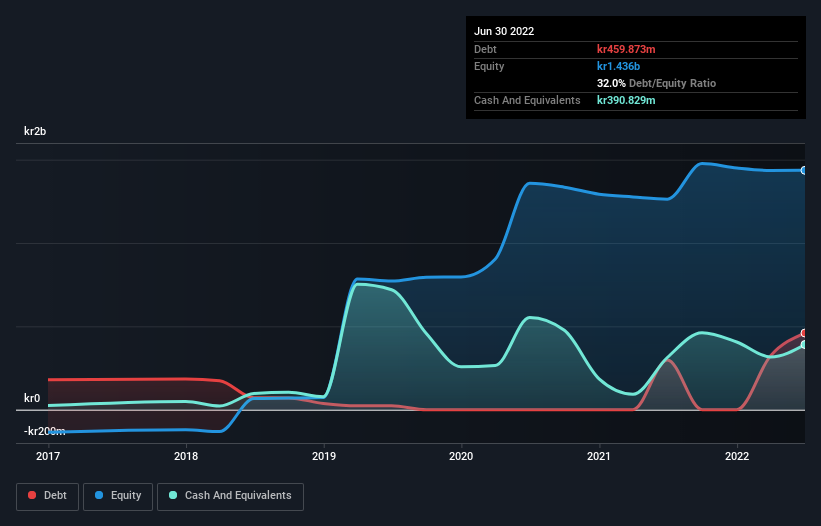
David Iben put it well when he said, 'Volatility is not a risk we care about. What we care about is avoiding the permanent loss of capital.' It's only natural to consider a company's balance sheet when you examine how risky it is, since debt is often involved when a business collapses. As with many other companies Ovzon AB (publ) (STO:OVZON) makes use of debt. But is this debt a concern to shareholders?
Why Does Debt Bring Risk?
Debt and other liabilities become risky for a business when it cannot easily fulfill those obligations, either with free cash flow or by raising capital at an attractive price. Part and parcel of capitalism is the process of 'creative destruction' where failed businesses are mercilessly liquidated by their bankers. However, a more usual (but still expensive) situation is where a company must dilute shareholders at a cheap share price simply to get debt under control. Having said that, the most common situation is where a company manages its debt reasonably well - and to its own advantage. The first step when considering a company's debt levels is to consider its cash and debt together.
Check out our latest analysis for Ovzon
What Is Ovzon's Debt?
The image below, which you can click on for greater detail, shows that at June 2022 Ovzon had debt of kr459.9m, up from kr297.9m in one year. On the flip side, it has kr390.8m in cash leading to net debt of about kr69.0m.

How Healthy Is Ovzon's Balance Sheet?
The latest balance sheet data shows that Ovzon had liabilities of kr61.6m due within a year, and liabilities of kr469.4m falling due after that. Offsetting this, it had kr390.8m in cash and kr70.7m in receivables that were due within 12 months. So its liabilities outweigh the sum of its cash and (near-term) receivables by kr69.5m.
Given Ovzon has a market capitalization of kr1.92b, it's hard to believe these liabilities pose much threat. However, we do think it is worth keeping an eye on its balance sheet strength, as it may change over time. The balance sheet is clearly the area to focus on when you are analysing debt. But it is future earnings, more than anything, that will determine Ovzon's ability to maintain a healthy balance sheet going forward. So if you're focused on the future you can check out this free report showing analyst profit forecasts.
In the last year Ovzon wasn't profitable at an EBIT level, but managed to grow its revenue by 104%, to kr299m. So its pretty obvious shareholders are hoping for more growth!
Caveat Emptor
Despite the top line growth, Ovzon still had an earnings before interest and tax (EBIT) loss over the last year. Indeed, it lost kr78m at the EBIT level. Considering that alongside the liabilities mentioned above does not give us much confidence that company should be using so much debt. Quite frankly we think the balance sheet is far from match-fit, although it could be improved with time. Another cause for caution is that is bled kr17m in negative free cash flow over the last twelve months. So to be blunt we think it is risky. For riskier companies like Ovzon I always like to keep an eye on the long term profit and revenue trends. Fortunately, you can click to see our interactive graph of its profit, revenue, and operating cashflow.
Of course, if you're the type of investor who prefers buying stocks without the burden of debt, then don't hesitate to discover our exclusive list of net cash growth stocks, today.
New: AI Stock Screener & Alerts
Our new AI Stock Screener scans the market every day to uncover opportunities.
• Dividend Powerhouses (3%+ Yield)
• Undervalued Small Caps with Insider Buying
• High growth Tech and AI Companies
Or build your own from over 50 metrics.
Have feedback on this article? Concerned about the content? Get in touch with us directly. Alternatively, email editorial-team (at) simplywallst.com.
This article by Simply Wall St is general in nature. We provide commentary based on historical data and analyst forecasts only using an unbiased methodology and our articles are not intended to be financial advice. It does not constitute a recommendation to buy or sell any stock, and does not take account of your objectives, or your financial situation. We aim to bring you long-term focused analysis driven by fundamental data. Note that our analysis may not factor in the latest price-sensitive company announcements or qualitative material. Simply Wall St has no position in any stocks mentioned.
About OM:OVZON
High growth potential with mediocre balance sheet.
Similar Companies
Market Insights
Community Narratives



